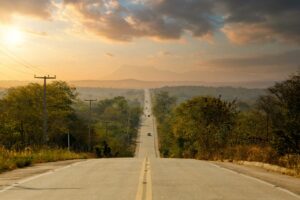You’re preparing for a big move or planning to attend a far-away event with your prized vehicle. As you start to map out your journey, you find yourself at a crossroads – should you drive your car to the destination or opt for long-distance towing? It’s a decision that can leave even the most seasoned drivers feeling anxious, and it’s no wonder why.
Studies have shown that a considerable number of Americans, roughly 66%, face driving anxiety, and a majority of them encounter it while carrying out common driving maneuvers. Rest assured, Agile Towing Company in Cary, NC is committed to helping you make the best choice for your long-distance vehicle transport needs.
In this article, we’ll dive into the key factors to consider when deciding between long-distance towing vs driving, including time, cost, convenience, and vehicle wear and tear. We’ll also explore scenarios where towing may be the preferable option, as well as situations where driving might be more suitable. By the end of this artilce, you’ll have a clear understanding of which option is best for you and your vehicle. And remember, if you ever find yourself in need of long-distance towing services in the Cary area, Agile Towing Company is just a phone call away at 1-(919) 276-5900.
Factors to Consider
Time
One of the primary factors to consider when deciding between towing and driving is the time involved. If you choose to drive, you’ll need to estimate the travel time based on the distance and route. This can be particularly time-consuming if you’re moving across the country or navigating unfamiliar areas. On the other hand, towing involves the duration of the towing process, including pickup and delivery. While it may take longer than driving, you can spend that time focusing on other tasks or travel arrangements.
Cost
Another important consideration is the cost. Driving your vehicle long-distance involves expenses such as fuel, food, lodging, and potential vehicle wear and tear. These costs can add up quickly, especially if you encounter unexpected delays or detours. Towing service fees, on the other hand, vary based on distance and vehicle type. While it may seem more expensive upfront, it’s essential to factor in the convenience and peace of mind that comes with professional towing services.
Convenience
When it comes to convenience, towing and driving each have their advantages. Driving offers flexibility in scheduling and allows you to make stops along the way as needed. However, it also requires a significant time commitment and personal effort. Towing, on the other hand, provides a hands-off approach. You can relax and focus on other aspects of your move or travel plans while your vehicle is safely transported to its destination.
Vehicle Wear and Tear
Long-distance driving can take a toll on your vehicle, adding additional mileage and potential strain on its components. This is particularly concerning if you’re transporting a classic, antique, or luxury vehicle. Towing, especially when using a flatbed truck, minimizes wear and tear on your vehicle. Your car is securely fastened and protected during transport, ensuring it arrives at its destination in the same condition as when it left.
Scenarios Where Towing May Be Preferable
There are several situations where opting for long-distance towing may be the better choice:
- Moving to a new city or state
- Transporting a classic, antique, or luxury vehicle
- Lack of time or ability to drive the vehicle personally
- Unfamiliar or challenging driving conditions
In these instances, the perks of towing regularly outshine the convenience factor of driving. Extensive time spent on the road has been associated with elevated chances of falling into detrimental patterns, including tobacco use, limited physical activity, reduced sleep, unhealthy weight gain, and a general decline in physical and mental well-being. By making the choice to have your vehicle towed, you can steer clear of these potential hazards and reach your journey’s end feeling invigorated and equipped to handle the forthcoming phases of your expedition.
Scenarios Where Driving May Be More Suitable
While towing offers many advantages, there are situations where driving your vehicle may be the more practical option:
- Shorter distances or nearby destinations
- Tight budget constraints
- Need for flexibility in travel plans
- Preference for personal control over the vehicle
If you’re comfortable behind the wheel and have the time and resources to make the drive, driving your vehicle may be the way to go. Just be sure to plan your route carefully, allow for plenty of rest stops, and prioritize your safety on the road.
Preparing for Long-Distance Towing
To guarantee a seamless towing experience, it’s essential to take several preparatory measures before your vehicle is collected. These steps will not only streamline the process but also provide you with peace of mind, knowing that your vehicle is ready for its long-distance journey.
Clean Out Your Vehicle
First and foremost, take the time to thoroughly clean out your vehicle, removing all personal belongings. This includes items such as clothing, electronics, and any valuables that you wouldn’t want to risk losing during transport. It’s also a good idea to remove or disable any toll tags or parking passes to avoid unwanted charges.
Secure Loose Items
Next, secure or remove any loose items within your vehicle that could potentially shift during transport. This might include removable car accessories, such as GPS devices or phone mounts, as well as any items in the glove compartment or center console. A full tank can add unnecessary weight and increase the risk of a fuel spill so it is suggested to fill it up to a quarter of your tank’s capacity.
Gather Necessary Paperwork
Before your vehicle is towed, gather all necessary paperwork and documentation. This may include your vehicle’s registration, proof of insurance, and a valid photo ID. If you’re transporting your vehicle across state lines, you may also need to provide additional documentation, such as a bill of sale or a notarized letter of authorization.
Communicate with the Towing Company
Lastly, maintain open communication with your chosen towing company. Discuss any special instructions or concerns you may have, such as specific pickup or delivery times, or any unique features of your vehicle that may require extra attention during transport. If your vehicle is inoperable or has any mechanical issues, be sure to inform the towing company in advance so they can make the necessary accommodations.
By dedicating time to these preparatory steps, you’ll help ensure a smooth and efficient towing process. Your vehicle will be ready for its long-distance journey, and you can rest assured that it will arrive at its destination in the same condition as when it was picked up. Remember, a little extra effort in the beginning can go a long way in guaranteeing a successful and stress-free towing experience.
Conclusion
Deciding between long-distance towing and driving requires careful consideration of various factors, including time, cost, convenience, and vehicle wear and tear. By weighing your options and assessing your unique circumstances, you can make an informed decision that best suits your needs.
At Agile Towing Company, we understand the importance of reliable, safe, and affordable long-distance towing services. With our expertise and commitment to customer satisfaction, we’re here to help make your long-distance vehicle transport as seamless as possible. If you’re in the Cary, NC area and need long-distance towing services, we invite you to call us directly at 1-(919) 276-5900 for more information or to request a quote.




